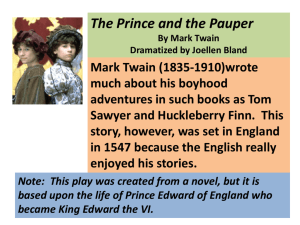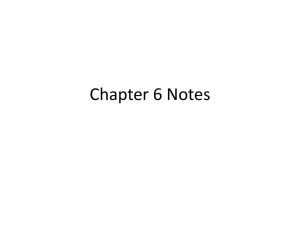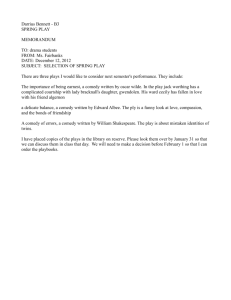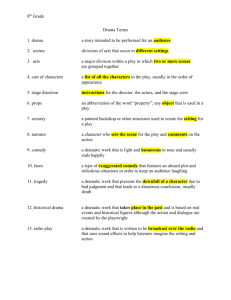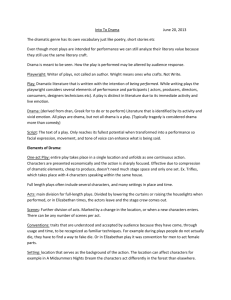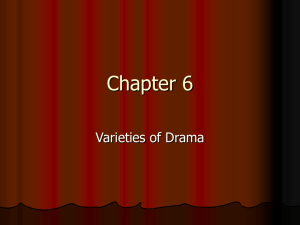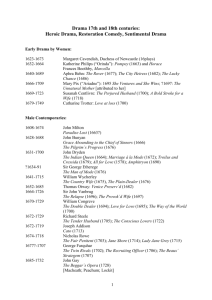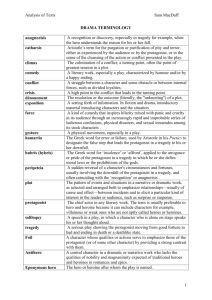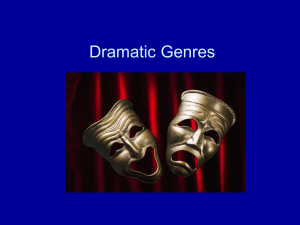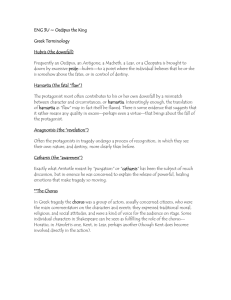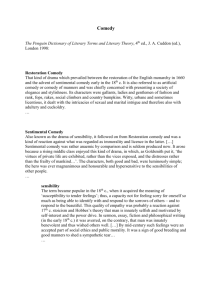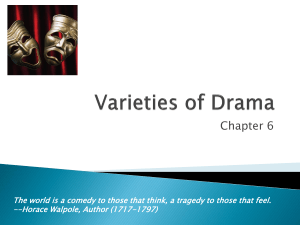Drama
advertisement
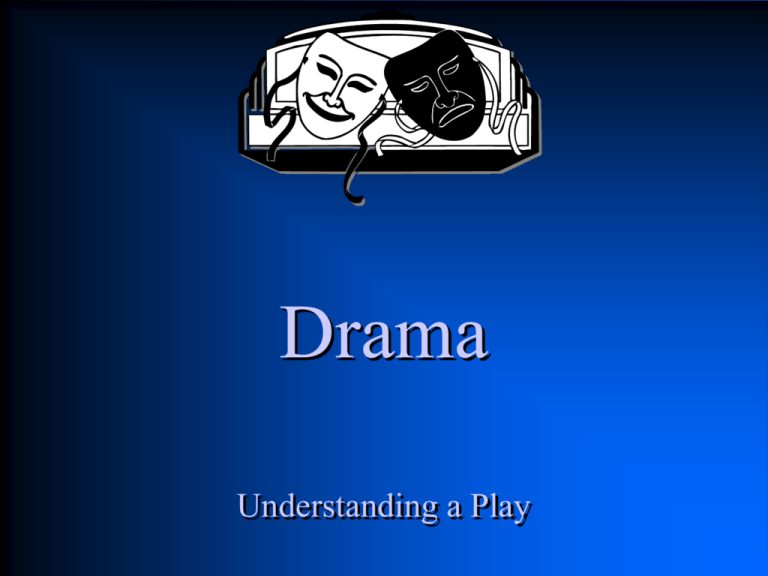
Drama Understanding a Play Plot Mountain in Drama Exposition: • Opening moments • Location (symbols and metaphors) • Meeting of characters • What happened before the curtain rose • What is happening now Rising Action: • We get involved • Puts forces on crash course to meet each other • Protagonist/Antagonist-journey towards each other • Dramatic situation: Usually describes the protagonist’s motivation and the forces that oppose its realization Climax: • Basic meeting of protagonist/antagonist • Tension reaches its greatest height • Does NOT HAVE to be dramatic • Dramatic question about to be answered Falling Action: • Events that occur as a result of the climax • We know the action will end soon • Recognizable in tragedies: the protagonist’s fortunes proceed downhill to an inexorable end Resolution/Denouement: • Final moments of the play • All the action is tied up • Characters may be enriched and wiser Characters Protagonist: • The leading character(s) • Usually a good force and the one the audience roots for Antagonist: • The character that comes in conflict with the main character • Does not always have to be “bad” or a person Foreshadowing • Always a type of foreshadowing in a play • Can take place as early as the exposition • Always be looking for clues while reading Dramatic Question(s) • The primary unresolved issue in a drama as it unfolds • The result of artful plotting, raising suspense and expectation in a play’s action as it moves toward its outcome Subplot Double plot • A secondary arrangement of incidents • Involves someone besides the protagonist • Usually occur in Shakespeare’s plays Stage Business • Nonverbal action that engages the attention of an audience • Can be as small as a doorknob turning, creating SUSPENSE Unities • 3 formal qualities recommended by Italian Renaissance literary critics to unify a plot in order to give it a cohesive and complete integrity • Action: Single series of interrelated actions— must be entirely serious or funny • Time: play takes place within 24 hours • Place: play takes place in a single location Closet Drama • A play designed to be read aloud rather than performed • Do you think Trifles fits this definition? Conventions • Customary methods of presenting an action, usual and recognizable devices that an audience is willing to accept • Ex.: classical Greek theater or the Elizabethan theater Soliloquy • A dramatic monologue in which we seem to overhear the character’s innermost thoughts uttered aloud Theme • The general point or truth about human beings that may be drawn from the play COMEDY An important difference between comedy and tragedy lies in the attitude toward human failing that is expected of us. Comedies present situations differently so there is a clear line between humor and tragedy. Comedy • Originated in festivities to celebrate spring • Ritual performances in praise of Dionysus • Whatever makes us laugh (broad definition) • Can be an entire play or only a part in the play (comic character or a comic situation) Satiric Comedy • Human weakness or folly is ridiculed from a vantage point of supposedly enlightening superiority • Tends to be critical of people, their manners, and their morals High Comedy • Relies more on wit and wordplay than on physical action for its humor • Points out the pretension and hypocrisy of human behavior • Avoids jokes about physical appearance Epigram • Brief and witty statement that memorably expresses some truth, large or small “There is only one thing in the world worse than being talked about, and that is not being talked about.” Comedy of Manners • A type of High Comedy • A witty satire set in elite or fashionable society • Popular in the Restoration Period (period after 1660 when Charles II reopened the London playhouses after being closed by the Puritans for being “immoral”) Low Comedy • Opposite extreme of humor • Places great emphasis on physical action and visual gags • Verbal jokes do not require much intellect to appreciate • Revels in making fun of whatever will get a good laugh • Satirizes human failings • Drunkenness, stupidity, lust, senility, trickery, insult, clumsiness Burlesque • A type of Low Comedy • A humorous parody or travesty of another play or kind of play • Usually makes fun of serious situations “Scary Movie(s)” Anyone? Farce • Another type of Low Comedy • Features exaggerated character types in ludicrous and improbable situations, provoking laughter about sexual mix-ups, crude verbal jokes, horseplay, etc. • Descendant of commedia dell’arte commedia dell’arte • Developed by guilds of professional Italian actors in the mid-sixteenth century • Playing stock characters, masked commedia players improvised dialogue around a given scenario (brief outline marking entrances of characters and the main course of action) Slapstick Comedy • Type of farce • Features pratfalls, pie throwing, fisticuffs, and other violent action • “The Three Stooges” Romantic Comedy • Plot focuses on one or more pairs of young lovers who overcome difficulties to achieve a happy ending (usually marriage) • A Midsummer Night’s Dream TRAGEDY • A play that portrays a serious conflict between human beings and some superior, overwhelming force • Ends sorrowfully and disastrously—outcome seems inevitable Tragedy • Protagonist undergoes a reversal of fortune, from good to bad, ending in catastrophe Tragic Flaw • A fatal weakness or moral flaw in the protagonist that brings him or her to a bad end. Tragedy Conventional Structure Prologue: Preparatory Scene Ex. Oedipus asking the suppliants why they have come and the priest telling about the plague ravaging Thebes Parados: The song for the entrance of the chorus Episodes: Action of play (like a scene or act) Separated by danced choral songs or odes Exodos: The last scene in which the characters and chorus concluded the action and departed The chorus usually has the final lines. Aristotle’s Concept of Tragedy 1. Protagonist—the hero or chief character is a person of “high estate” (royalty) 2. Tragic hero is fallible 3. Downfall is a result of hamartiathe hero’s error or transgression or his flaw or weakness of character 4. Hubris extreme pride, leading to overconfidence Aristotle Cont… 5. Purgation (or katharsis) final effect of the playwright’s skillful use of plotting, character, and poetry to elicit pity and fear from the audience refers to the feeling of emotional release or calm the spectator feels as the end of tragedy Taught the audience compassion for the vulnerabilities of others and schooled in justice and other civic virtues Aristotle Cont… 6. Recognition the discovery of some fact not known before or some person’s true identity 7. Reversal reversal in fortune Usually occurs when a certain result is expected and instead its opposite effect is produced
